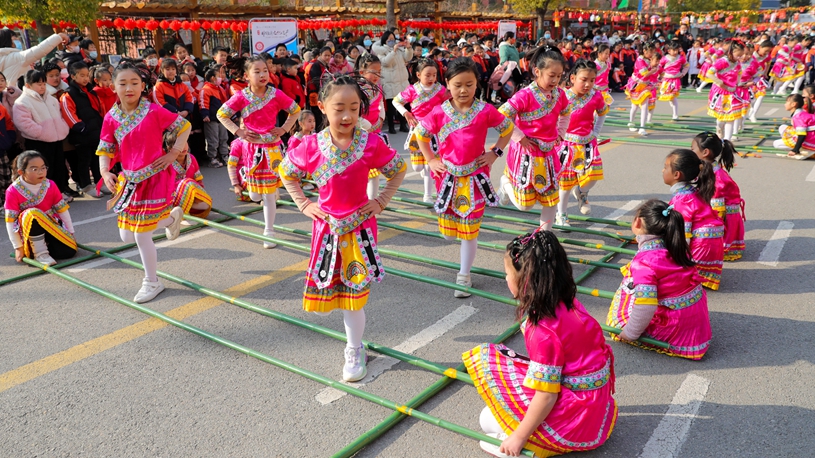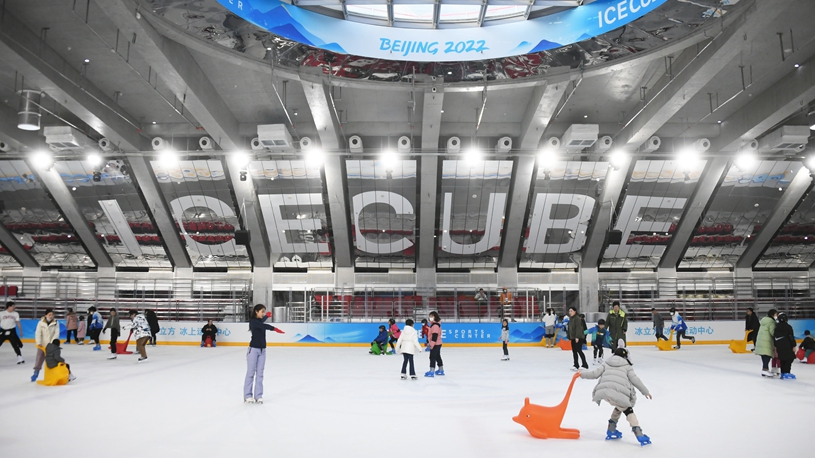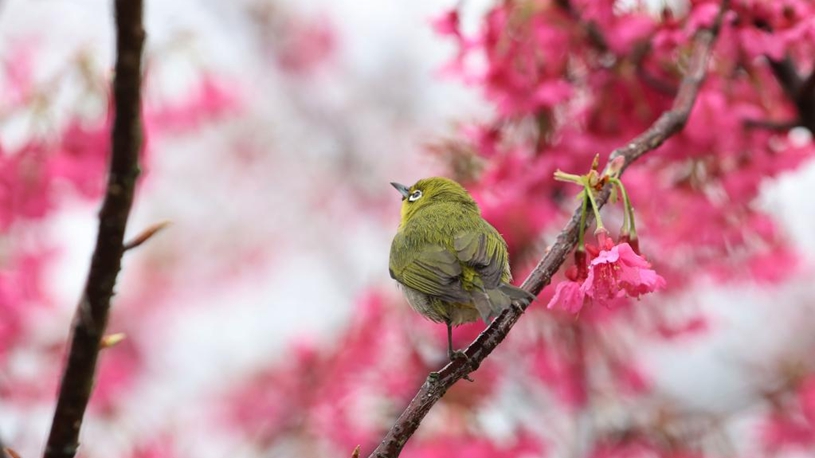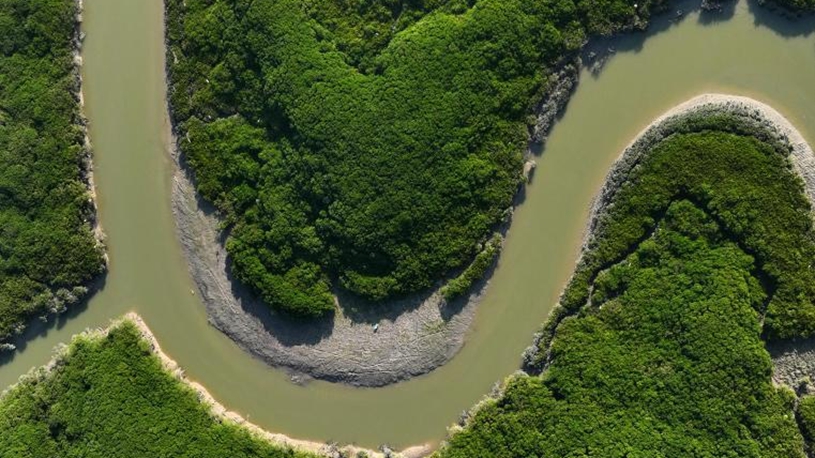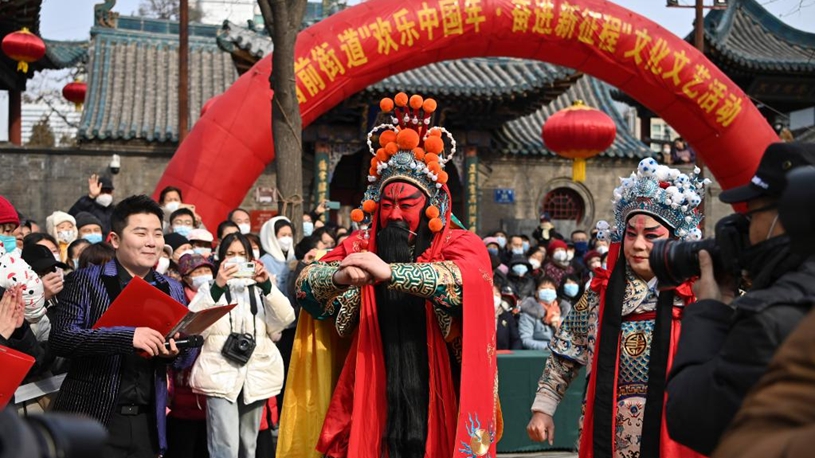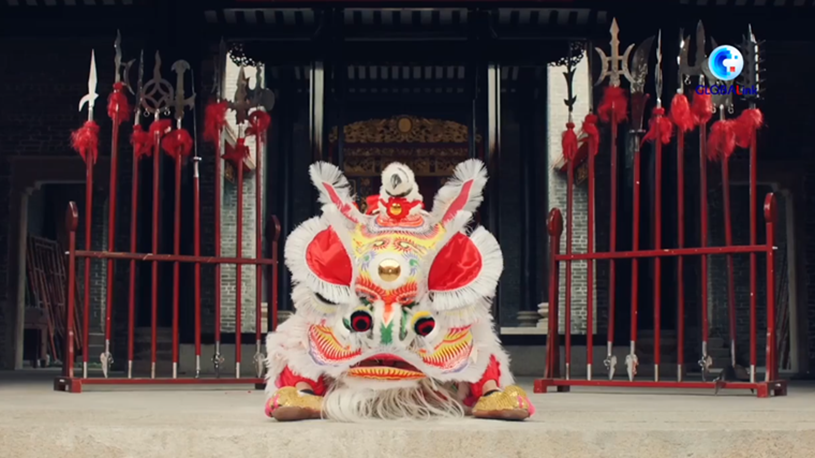* The Chinese mainland fully resumed normal travel with the Hong Kong and Macao special administrative regions starting Monday.
* The full travel resumption, made possible by China's decision to optimize its COVID-19 response late last year, will further facilitate the integrated development of the Guangdong-Hong Kong-Macao Greater Bay Area.
* Tourism and other once-vibrant industries, battered over the past three years, are expected to gradually recover.
SHENZHEN/HONG KONG, Feb. 6 (Xinhua) -- The Chinese mainland fully resumed normal travel with the Hong Kong and Macao special administrative regions (SARs) starting Monday, in what is expected to be a strong boost for the two regions' economic development.
Starting Monday, the Lo Wu Control Point, the Lok Ma Chau/Huanggang Control Point and the Heung Yuen Wai/Liantang Control Point opened up, marking the full resumption of the functioning of all seven land boundary control points between Shenzhen and Hong Kong.
Monday's first group of travelers included students, cyclists, and people traveling for business and family reunions.
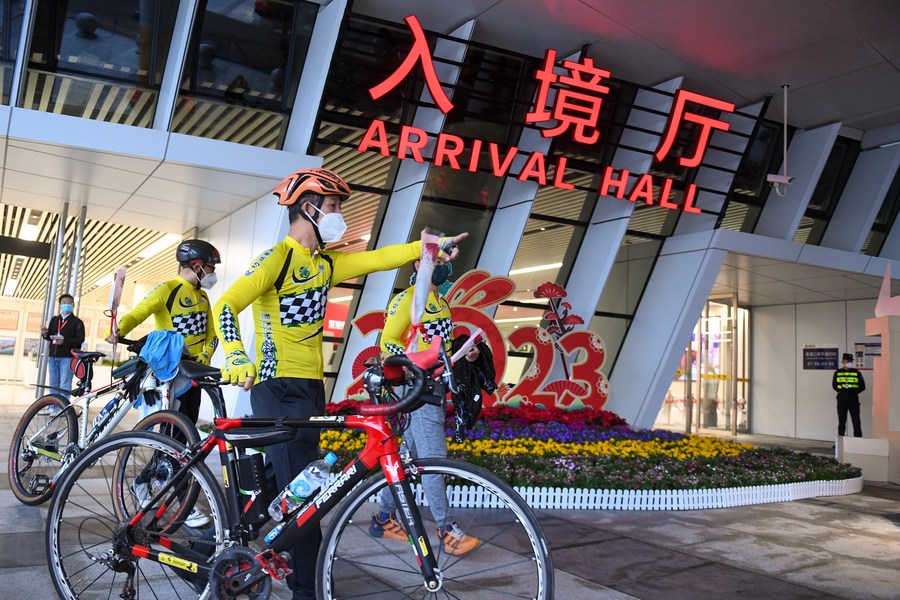
Cycling enthusiasts from Hong Kong arrive in Shenzhen, south China's Guangdong Province, Feb. 6, 2023. (Xinhua/Mao Siqian)
At the Liantang Control Point, red welcome banners and flower bouquets added to the joyful atmosphere greeting commuters. Around 6:30 a.m., cross-boundary students and their parents, who were about to leave for Hong Kong for the new semester, were already queued up for departure.
Pan Qiaojuan, who lives in Shenzhen's Luohu district, arrived early with her son for the long-awaited trip. "I've been looking forward to this moment. Today, my son will go back to his middle school in Hong Kong and we will also visit his grandparents there. We haven't seen one another for a long time."
The full travel resumption, made possible by China's decision to optimize its COVID-19 response late last year, will further facilitate the integrated development of the Guangdong-Hong Kong-Macao Greater Bay Area. Services at land ports between Guangdong and Hong Kong were suspended in February 2020, due to the epidemic. Land and water travel partially resumed on Jan. 8, 2023.
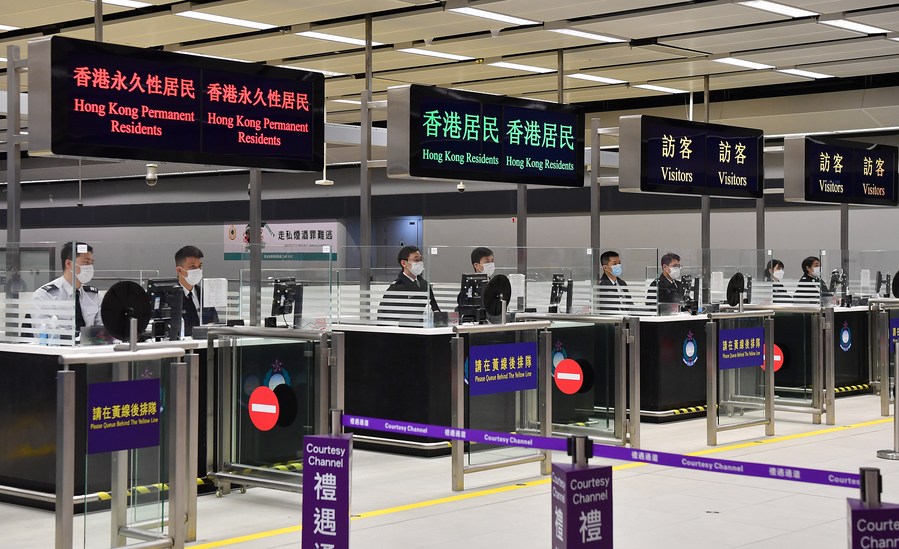
Staff members are on duty at the departure hall of the Heung Yuen Wai/Liantang Control Point at the Hong Kong-Shenzhen boundary in south China, Feb. 6, 2023. (Xinhua/Chen Duo)
A passenger surnamed Gunn became the first inbound passenger through the Lo Wu Control Point. "I only went back once or twice a year before, but now I'll be able to return every week," Gunn said, adding that the customs procedure took only five minutes.
John Lee, chief executive of the Hong Kong SAR, said he believes that Hong Kong will be more prosperous and active in 2023, thanks to the full resumption of cross-boundary travel between Hong Kong and the mainland, which will greatly boost people-to-people exchanges.
Tourism and other once-vibrant industries, battered over the past three years, are expected to gradually recover. Starting Monday, group tours between the mainland and the two SARs also resumed.
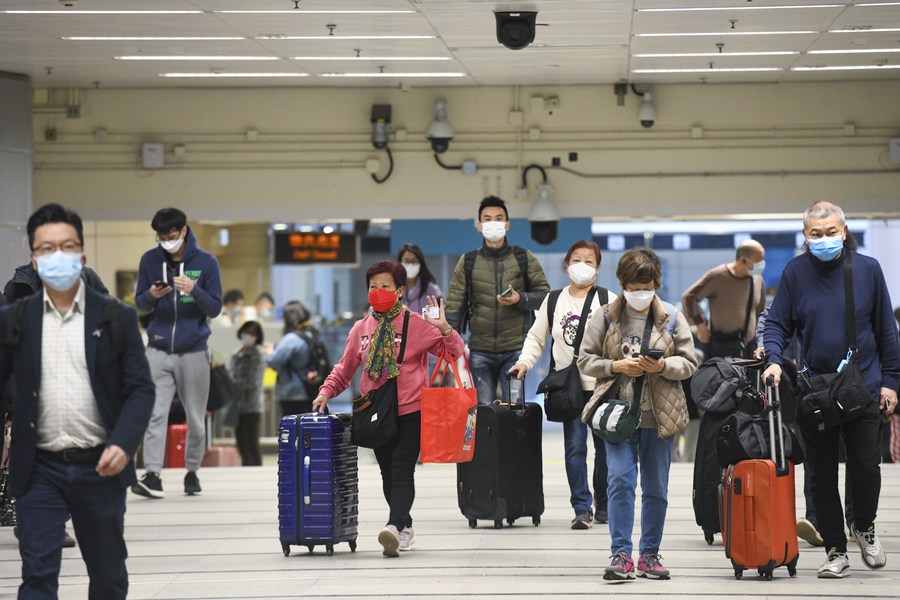
The first batch of travellers from Hong Kong to Shenzhen pass the bridge linking the two cities at the Lo Wu Control Point at the Hong Kong-Shenzhen boundary in south China, Feb. 6, 2023. (Xinhua/Liang Xu)
Tourists from the Chinese mainland have long made up the majority of visitors to Hong Kong, accounting for 78.29 percent of the 55.91 million arrivals in 2019.
On Monday, a total of 135 people from six mainland tour groups arrived in Macao. The Macao Government Tourism Office held welcoming ceremonies at the Hengqin port and Macao International Airport respectively, presenting souvenirs to tour group members. Also, the first Macao tour group of 37 people set out for Hengqin port on the same day.
"I like Macao very much but haven't been here since the epidemic," said a Zhuhai resident surnamed Fan, who traveled with the group on Monday. "With subsidies from the Macao SAR government, my tour is a lot cheaper."
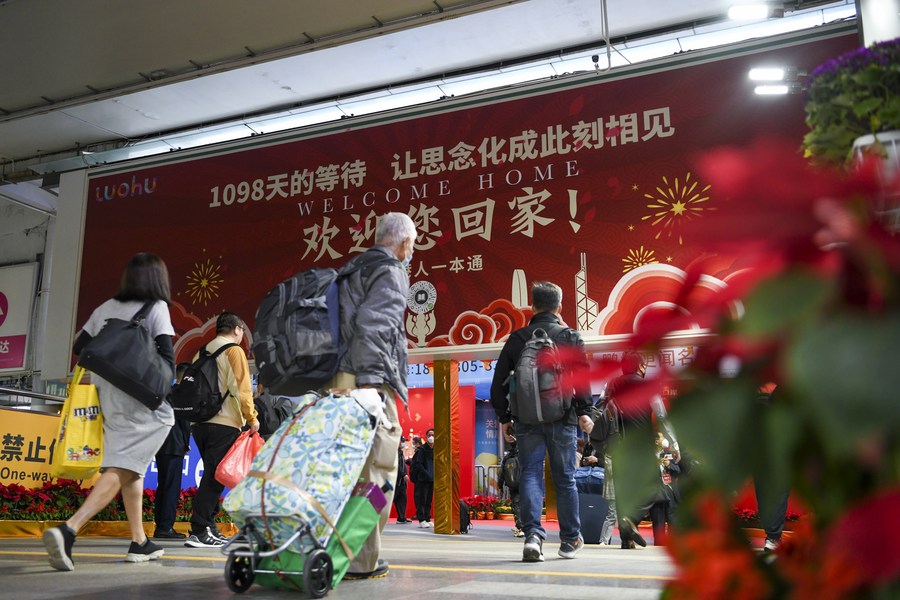
Travellers arrive in Shenzhen, south China's Guangdong Province, Feb. 6, 2023. (Xinhua/Liang Xu)
The resumption of group tours is expected to further elevate Macao's tourism industry, a major propellant for its economy. "Tour operators in Macao have been making preparations to embrace a full recovery," said Zhang Jianzhong, chairman of China Travel Service (Macao) Ltd.
Data from online travel agency Trip.com Group showed that as of Saturday, bookings for Hong Kong and Macao trips this week by mainland residents were up 228 percent year on year.
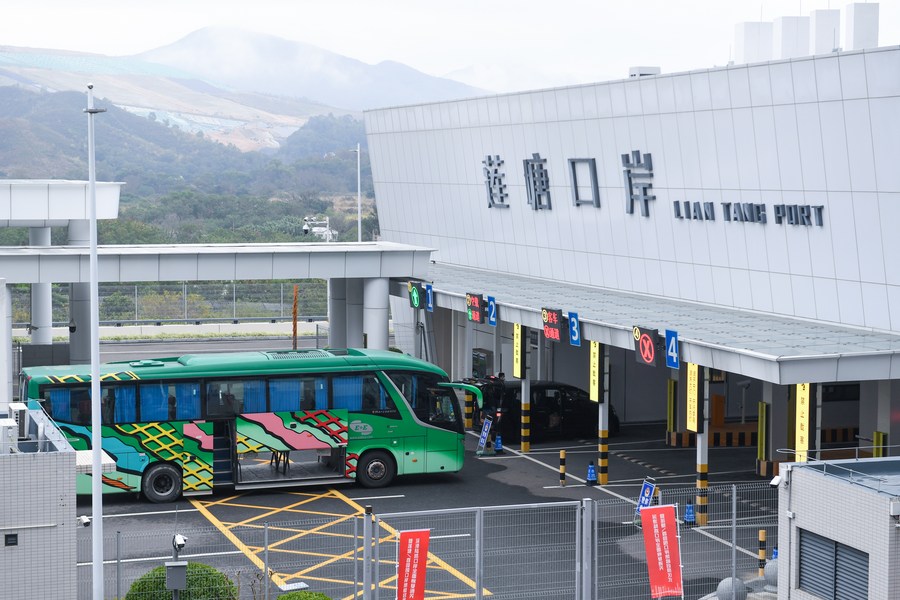
Vehicles depart for Hong Kong at the Heung Yuen Wai/Liantang Control Point at the Hong Kong-Shenzhen boundary in south China, Feb. 6, 2023. (Xinhua/Mao Siqian)
"Normal travel will accelerate the recovery of the catering, shopping and entertainment sectors in Hong Kong and Macao, benefit tourism enterprises and businesses in the two regions, and strengthen the exchanges between Hong Kong, Macao and the mainland," said Zeng Guojun, professor of the school of tourism, Sun Yat-sen University.
(Video reporters: Li Sijia, Bai Yu, Liang Xizhi, Mao Siqian, Liang Jiajun, Zhang Yichi, Wan Houde; Video editors: Zhou Saang, Cao Ying, Zhao Xiaoqing) ■

